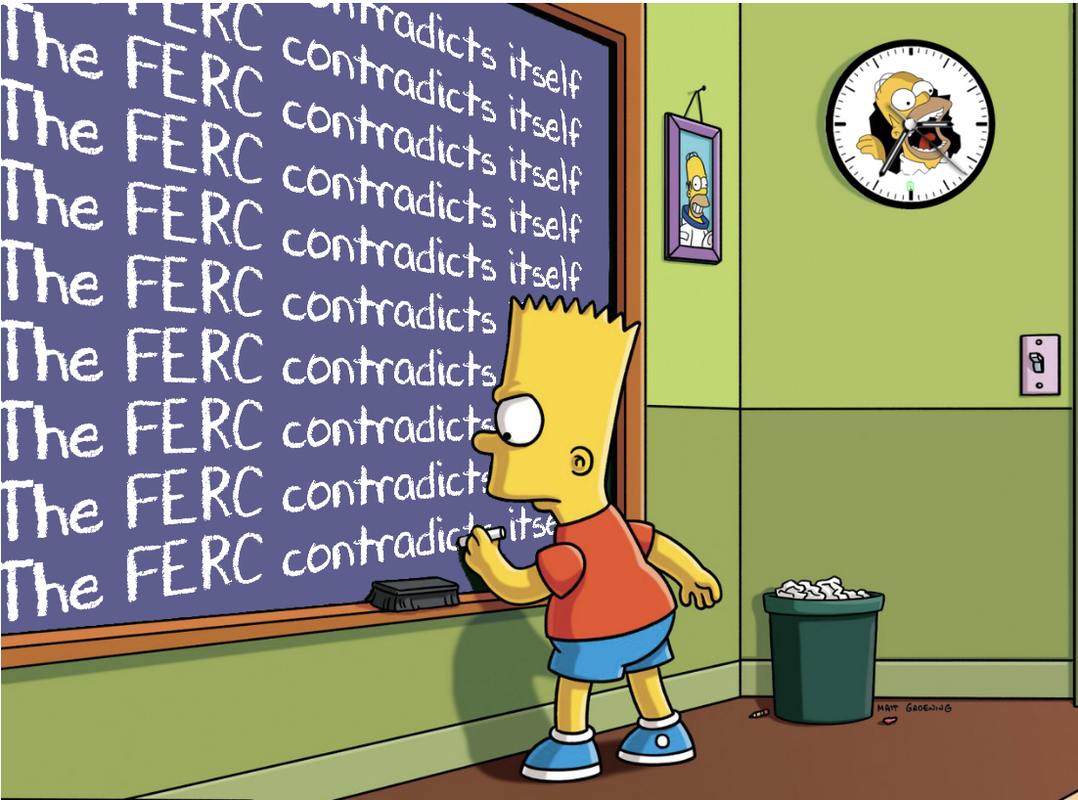Last year, GBE asked FERC to "amend" the negotiated rate authority issued to the project in 2014. However, FERC conducted a review de novo, as it would have a reviewed a new application. GBE's original authority is history, but FERC also granted new authority based on GBE's application. FERC also said that GBE did not need to file for negotiated rate authority before selling capacity (d'oh GBE). Under Commission policy, a merchant transmission developer can either opt to file in advance to show it has met the Commission's four factor analysis, or it could just submit everything after the fact and hope it got things right.
While FERC said that GBE met the first and forth factor, it is reserving judgment of the second and third factor until after GBE makes a later filing. But there were some leaps of logic in there that makes me wonder what FERC is up to.
First leap...
Grain Belt notes that this area is within the geographic footprint of Southwest Power Pool, Inc. (SPP), but the generation will not be interconnected to the SPP transmission system.
But then FERC turns around and says these things:
The GBE system consists of (in part): AC overhead transmission lines to connect the converter stations to portions of the SPP, MISO, and AECI managed electrical systems in Kansas and Missouri.
And that...
Grain Belt contends that Phase 1 will increase resilience for the SPP, MISO, and AECI Balancing Authority Areas (BAAs) by allowing the potential of one BAA to import a large amount of power from another BAA to bolster system reliability and improve the ability of each BAA to recover after a power failure.
But it doesn't stop there, and the rest of them are not so inconsequential.
In the 2014 Order, the Commission directed Grain Belt “to make a filing disclosing the results of the capacity allocation process within 30 days after the close of the open solicitation process.” Grain Belt did not submit a compliance filing during the required timeframe and, as such, has not satisfied the conditions of its initial grant of negotiated rate authority. Grain Belt indicates that it will seek approval of the Initial TSAs in a future compliance filing. Given the Project changes described in the instant filing and the passage of time, the Commission will conduct a de novo review of the Initial Open Solicitation and the Initial TSAs at such time as Grain Belt submits a filing providing sufficient detail to evaluate whether the capacity allocation process satisfied the Commission’s requirements.
And here's the worst leap of logic in the whole thing...
GBE says it was not required to get FERC's approval for the sale of the project (and its Negotiated Rate Authority). The Illinois protestors say that approval was required and made extensive arguments to support their contention. And what did FERC do? It chucked that whole argument because it ruled that GBE's prior negotiated rate authority does not exist because they reviewed and granted new authority de novo. That makes the entire argument moot and FERC does not need to make a decision on whether it should have approved the sale.
Given that we are reviewing Grain Belt’s filing de novo, we find moot protestors’ argument that Grain Belt may not rely on the Commission’s prior grant of negotiated rate authority in the 2014 Order because Grain Belt failed to obtain section 203 approval. Our findings here are based on Grain Belt’s current ownership structure and project design, and thus do not turn on whether prior section 203 authorization was required for either Invenergy’s acquisition of Grain Belt, or the transfer of Grain Belt’s negotiated rate authority.
Grain Belt’s request for continued authority to sell transmission rights at negotiated rates is hereby granted in part, as discussed in the body of this order.
And here's another easter egg for FERC... GBE said approval for a sale is only required if the sale was made AFTER the project was energized. Therefore, GBE won't actually have to get approval of any sales it makes before the project is in service, which includes all the sales it intends to make now during its sale of capacity and undivided interests in the project. Again... FERC says do whatever the heck you want, GBE, we'll settle up later. The only hazard there is one for GBE... perhaps a different group of Commissioners and staff is going to be scrutinizing your compliance filing after you finish selling your project, and maybe they don't have such a permissive style of regulating based on one administration's push for "clean energy". GBE is cocked and ready to make as many fatal mistakes as necessary... well, if anyone is even interested in buying transmission capacity from Kansas to Missouri. Will they be interested in a $7B project from unspecified generators to a connection point in Missouri that may be ready in 2030 when MISO is building a competing project that costs a lot less and is scheduled to be online in 2028?
Have at it, GBE, but watch your back, FERC's not done with you yet.
| gbe_nra_order.pdf |

 RSS Feed
RSS Feed